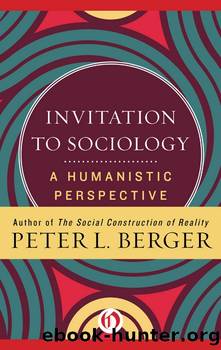Invitation to Sociology by Peter L. Berger

Author:Peter L. Berger [Berger, Peter L.]
Language: eng
Format: epub
ISBN: 9781453215401
Publisher: Open Road Integrated Media
Published: 2011-08-14T16:00:00+00:00
6. SOCIOLOGICAL PERSPECTIVE—SOCIETY AS DRAMA
IF THE ATTEMPT at communication in the preceding two chapters has been successful, the reader may now have a sensation that could perhaps be described as sociological claustrophobia. He can be conceded a certain moral right to demand some relief from this from the writer, in the way of an affirmation of human freedom in the face of the various social determinants. Such an affirmation, however, poses a priori difficulties within the framework of a sociological argument. It will be necessary to look at these difficulties briefly before we proceed.
Freedom is not empirically available. More precisely, while freedom may be experienced by us as a certainty along with other empirical certainties, it is not open to demonstration by any scientific methods. If we wish to follow Kant, freedom is also not available rationally, that is, cannot be demonstrated by philosophical methods based on the operations of pure reason. Remaining here with the question of empirical availability, the elusiveness of freedom with regard to scientific comprehension does not lie so much in the unspeakable mysteriousness of the phenomenon (after all, freedom may be mysterious, but the mystery is encountered every day) as in the strictly limited scope of scientific methods. An empirical science must operate within certain assumptions, one of which is that of universal causality. Every object of scientific scrutiny is presumed to have an anterior cause. An object, or an event, that is its own cause lies outside the scientific universe of discourse. Yet freedom has precisely that character. For this reason, no amount of scientific search will ever uncover a phenomenon that can be designated as free. Whatever may appear as free within the subjective consciousness of an individual will find its place in the scientific scheme as a link in some chain of causation.
Freedom and causality are not logically contradictory terms. However, they are terms that belong to disparate frames of reference. It is, therefore, idle to expect that scientific methods will be able to uncover freedom by some procedure of elimination, piling up causes on causes, until one arrives at a residual phenomenon that does not seem to have a cause and can be proclaimed as being free. Freedom is not that which is uncaused. Similarly, one cannot arrive at freedom by looking at instances where scientific prediction falls down. Freedom is not unpredictability. As Weber has shown, if this were the case, the madman would be the freest human being. The individual who is conscious of his own freedom does not stand outside the world of causality, but rather perceives his own volition as a very special category of cause, different from the other causes that he must reckon with. This difference, however, is not subject to scientific demonstration.
An analogy may be helpful here. Just as freedom and causality are not contradictory but rather disparate terms, so are utility and beauty. The two do not logically exclude each other. But one cannot establish the reality of the one by demonstrating the reality of the other.
Download
This site does not store any files on its server. We only index and link to content provided by other sites. Please contact the content providers to delete copyright contents if any and email us, we'll remove relevant links or contents immediately.
| Biomathematics | Differential Equations |
| Game Theory | Graph Theory |
| Linear Programming | Probability & Statistics |
| Statistics | Stochastic Modeling |
| Vector Analysis |
Weapons of Math Destruction by Cathy O'Neil(5027)
Factfulness: Ten Reasons We're Wrong About the World – and Why Things Are Better Than You Think by Hans Rosling(4011)
Factfulness_Ten Reasons We're Wrong About the World_and Why Things Are Better Than You Think by Hans Rosling(2750)
Descartes' Error by Antonio Damasio(2727)
A Mind For Numbers: How to Excel at Math and Science (Even If You Flunked Algebra) by Barbara Oakley(2688)
TCP IP by Todd Lammle(2633)
Applied Predictive Modeling by Max Kuhn & Kjell Johnson(2472)
Fooled by Randomness: The Hidden Role of Chance in Life and in the Markets by Nassim Nicholas Taleb(2407)
The Book of Numbers by Peter Bentley(2399)
The Tyranny of Metrics by Jerry Z. Muller(2397)
The Great Unknown by Marcus du Sautoy(2178)
Once Upon an Algorithm by Martin Erwig(2141)
Easy Algebra Step-by-Step by Sandra Luna McCune(2110)
Practical Guide To Principal Component Methods in R (Multivariate Analysis Book 2) by Alboukadel Kassambara(2087)
Lady Luck by Kristen Ashley(2067)
Police Exams Prep 2018-2019 by Kaplan Test Prep(2027)
Linear Time-Invariant Systems, Behaviors and Modules by Ulrich Oberst & Martin Scheicher & Ingrid Scheicher(1980)
All Things Reconsidered by Bill Thompson III(1957)
Secrets of Creation, Volume 1: The Mystery of the Prime Numbers by Watkins Matthew(1858)
